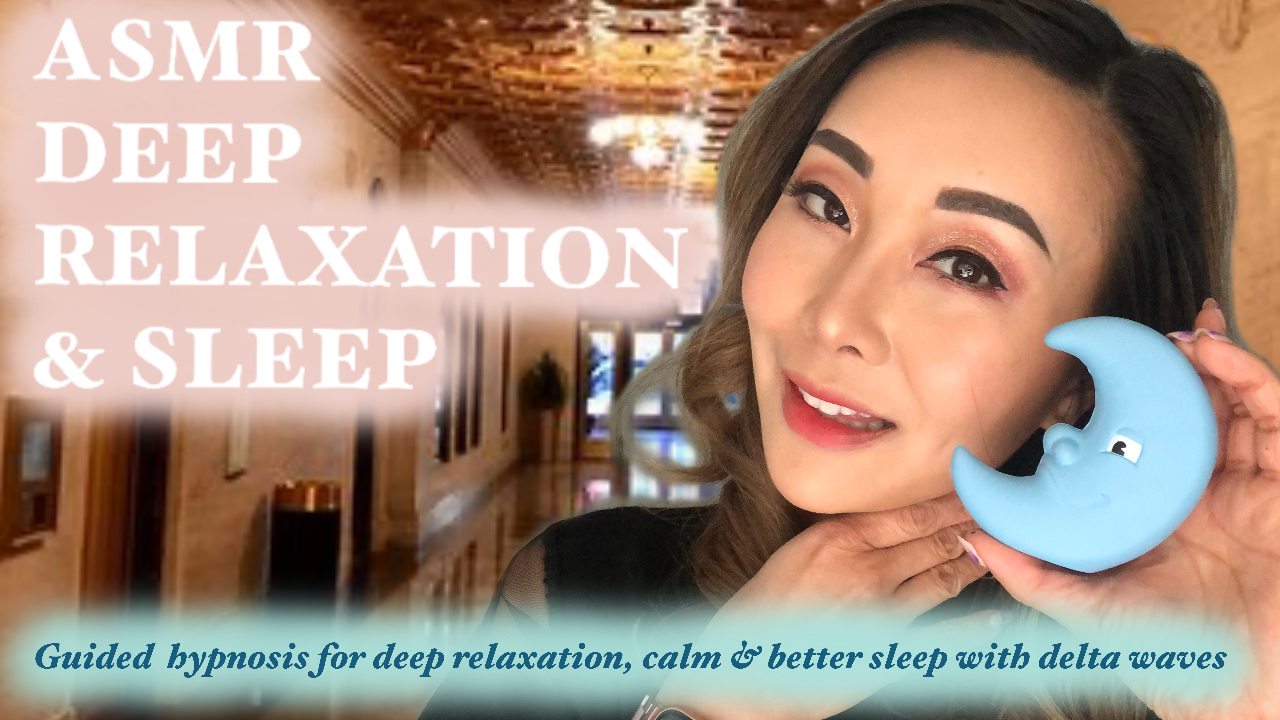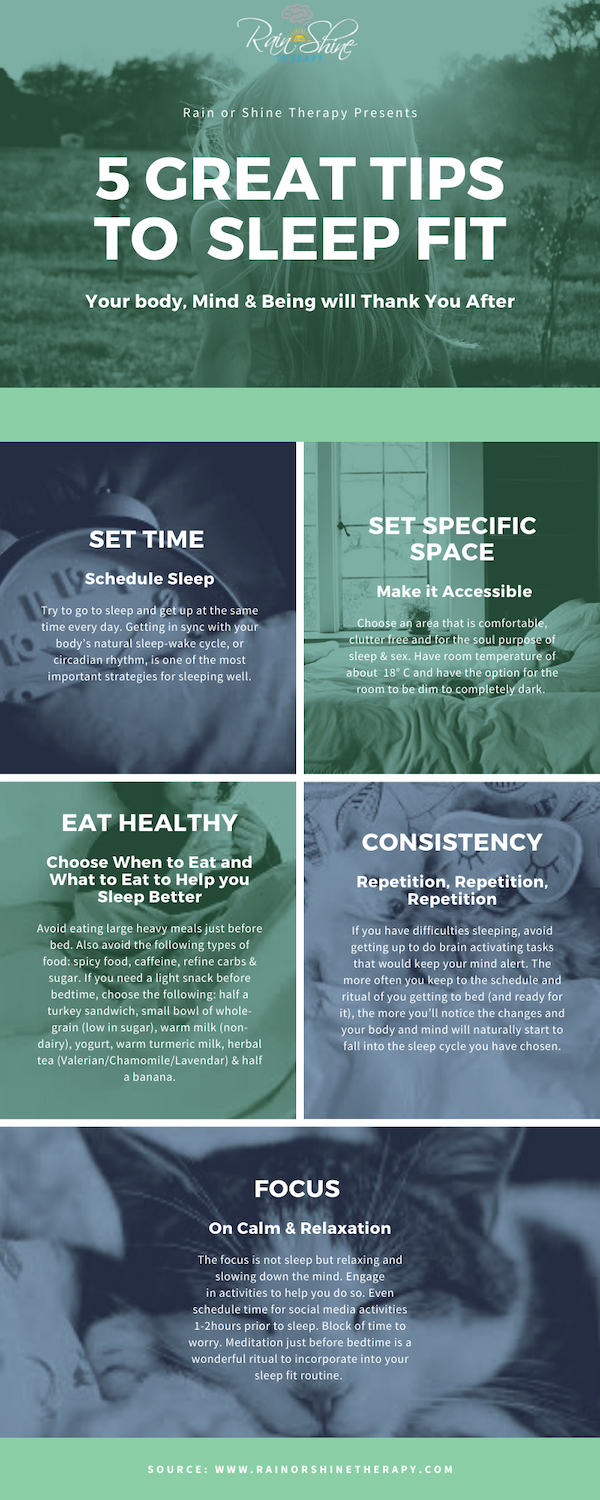
Sleep Fit – How approaching sleep like fitness will improve the way you sleep and the quality of it.
Restful sleep and feeling recharged after we wake up not only leaves us feeling better, it has direct positive effects on our mental and physical health. When we lack proper sleep, it can take a serious toll on our energy levels, productivity, emotional balance, and even physical health. Yet I find many of my clients (including people around me), share that their stressed minds would keep going and they would often lie restlessly in bed; regularly tossing and turning at night struggling to get the sleep they need. In fact, once they hit the bed, they find that their minds would race even more. At that point, getting a good night’s sleep may seem like an impossible goal to achieve.
So, should we just give up on sleep: feeling rested and recharged? The good news is we have much more control over the quality of our sleep than we probably realize. In fact, you may already be practicing some skills in your daily routine that helps with sleeping better without realizing it. Just as the way you feel during your waking hours often hinges on how well you sleep at night, so the cure for sleep difficulties can often be found in our actions.
Let’s shift our awareness on how we view and approach sleep. Very few of us think of it with a fitness mindset. Often, we interpret it as something we do at the end of our day when we’re tired. With the busy lives and constant stimuli/distractions we are surrounded by, sleeping well and feeling fully rested is something greatly desired and not always easily achieved. If we apply the methodology of fitness to sleep, we in turn are “sleeping fit”.
What is “sleeping fit”? Well let’s take a look at what fitness means. Fitness is defined as the condition of being physically fit and healthy. Being fit not only means physical health, but emotional and mental health too. Similarly, these benefits are reaped when we’re sleeping well. Let’s break it down even more. When we think of fitness practices we do the following: set time for it, set a space for it, focus on the task at hand, repetition & consistency, eating healthy, following a program that allows us to be consistent and successful, and making it accessible. If we applied these basics to our physical fitness to sleep, we in turn are practicing good sleep behaviours, thus “sleeping fit”.
So how do we “sleep fit” (sleep better)? Here are five sleep fitness tips:
Tip 1: Set Time
When we exercise, we set time aside and we schedule it into a regular routine. We can do the same with our sleep. Try to go to sleep and get up at the same time every day. Avoid sleeping in, even during weekends or when you’re on vacation mode. Getting in sync with your body’s natural sleep-wake cycle, or circadian rhythm, is one of the most important strategies for sleeping well. If you keep a regular sleep-wake schedule, you’ll feel much more refreshed and energized than if you sleep the same number of hours at different times, even if you only alter your sleep schedule by an hour or two. You’ll start to notice, that you’ll naturally start feeling sleepy at a certain time and wake up even prior to your alarm once you follow this schedule closely.
Tip 2: Set Space and make it Accessible
Similar to working out, you choose a specific area, environment and equipment to achieve your exercise goals. You don’t go to the gym to sleep or conjure your next work proposal or even to cook up a feast. You go to the gym to work out and exercise. Correspondingly, your sleep setting should be treated the same way.
Here is how:
- Avoid bright screens within 1-2 hours of your bedtime especially in your bedroom. The blue light emitted by your phone, tablet, computer, or TV is especially disruptive. You can minimize the impact by using devices with smaller screens, wearing blue light filter glasses, turning the brightness down, or using light-altering software.
- Avoid late-night shows/television. Not only does the light from a TV suppress melatonin, but many programs are stimulating rather than relaxing. Try listening to music or audio books instead.
- Make sure the room is dark when it’s time to sleep. Keep the lights down low if you get up during the middle of the night.
- Keep your room cool and quiet. Most people sleep best in a slightly cool room (around 18° C). Studies have proven how temperature can effect our sleep.
- Make sure your bed is comfortable.
- Leave your bed for sleeping and sex only. When you work, watch TV or engage in other activities in bed, your brain will develop associations of being alert instead of feeling relaxed and ready for sleep.
Lastly, you are also more likely to go to the gym or hop on that equipment if it’s easy to get to. This is the same for sleep. Make sure your sleeping room is a space you would want to go to; feeling comfortable and easily accessed. Also ensure that it’s clutter free and requires little effort to get into bed.
Tip 3: Eating healthy
What we put into our bodies: eat and drink can affect our sleep.
- Avoid big meals at night especially spicy or acidic food that can cause stomach trouble or heartburn.
- Avoid alcohol before bed. Alcohol disrupts sleep cycles. Even though a night cap helps you fall asleep, you many not feel rested when you wake up.
- Reduce caffeine, sugary and refined carbs. All these types of food can trigger wakefulness at night and pull you out of the deep REM, restorative stages of sleep.
For some people, who need to eat frequently or get hungry at night and require a light snack before bed, the following is recommended:
Nighttime snacks to help you sleep
- Half a turkey sandwich
- A small bowl of whole-grain, complex carbohydrates, low-sugar cereal
- Milk (non-dairy is optional) or yogurt (with turmeric and small amount of honey)
- Herbal tea: Valerian Tea, Chamomile Tea, Lavender Tea
- Half a banana
Tip 4: Following a program and repetition
Once you have chosen a realistic and achievable environment and sleep schedule, stick to it! It may feel uncomfortable at first and you may not even notice any results right away. This is quite normal to experience. This is because, during any changes our brains have a natural tendency to resist these differences we make as we’re not getting the dopamine we’re used to from our habitual behaviors.
Dopamine – a neurotransmitter involved in processing rewards in the brain – which makes us more likely to opt for instant gratification (like watching another Netflix show, checking our Instagram), rather than waiting for a more beneficial reward later on (for instance, toned body/abs). Imagine that our brain and these neural transmitters are like roads: Behaviours, thoughts, actions, and feelings we engage in frequently would form highways and things that are new (changes) are like dirt roads. For ease and speed, isn’t it much faster to use the highway than the newly formed dirt road? That is how our brain works and that is why we resist change.
Bonus Tip:
If you have difficulties sleeping, avoid getting up to do brain activating tasks that would keep your mind alert. The more often you keep to the schedule and ritual of you getting to bed (and ready for it), the more you’ll notice the changes and your body and mind will naturally start to fall into the sleep cycle you have chosen. This is no different than building those muscle memories during fitness activities. Repetition, repetition, repetition!
Tip 5: Focus on the task at hand
Whether it’s running, biking or lifting heavy weights we know that keeping awareness of what we’re doing is important. By having proper form and engaging with what we’re doing, it helps prevent injury and to yield best results. This mindset is the same for sleep. If we focus our minds on the right things, we wind down and be in that mental state ready for sleep.
Often people who cannot fall asleep, stay asleep or even choose to sleep (because they don’t have the time) are distracted by their thoughts. Whether the thoughts are about the next exam, project or deadline that needs to be met, finances, an upcoming trip you’re excited about, or the fears and nervousness about meeting your partner’s parents for the first time (and the list can go on), all of them pull your focus away from sleep. They are distractions that does the opposite of winding down and to relax.
Now on the other hand, when all you can think about is sleep and why you aren’t asleep yet, you find that sleep eludes you as well. What irony! In fact, thinking of sleep doesn’t mean you’re focused on it. This is because your mind is not slowing down, being calm and relaxed. In reality the focus is not sleep but relaxing and slowing down the mind.
The following are a few tips on how we can do just that:
- Set times to check your phone, social media and any notices which is at least an hour before bedtime.
- Schedule time to worry – this is a step to help you manage your racing thoughts and stress.
- Listen to soft music that are 60 beats or slower.
- Meditation
- Engage in calming activities or things that effects our ASMR – autonomous sensory meridian response. It is a response that evokes a feeling of euphoric tingling and relaxation that comes over the sympathetic nervous system. It can be activated by watching a video, hearing certain sounds, petting an animal, or getting a scalp massage with slow gentle motions done with a scalp scratcher.
- Prepare your mind for sleep, such as practicing relaxation techniques: taking a warm bath, or dimming the lights and listening an audiobook
With these above tips in mind, understand that you don’t have to do it all and only adopt things that resonates with you. Please note that there is no exact right or wrong way. What you choose to become part of your “sleep fitness” will take commitment and consistency – Do it and stick with it!
If you do have troubles relaxing before sleep and curious about ASMR, please feel free to visit this video link to help you achieve deep relaxation and sleep. It is guided hypnosis video on deep calm, relaxation and better sleep with delta waves.




